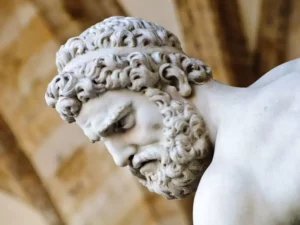Hercules

Hercules or Heracles, being a metathesis of the Greek name. He was the son of Jupiter, the Roman equivalent of the Greek god Zeus, and the mortal Alcmene. He performed twelve great labors, called the Twelve Labors of Heracles, and was deified.
The Romans adopted the Greek version of his life and works without essential changes, but added anecdotal details of their own, some of them relating the hero to the geography of the western Mediterranean.
Roman legends
Fight with Caco
Roman legends about Hercules relate to his journey to the western Mediterranean to steal Geryon's cattle, one of his well-known "twelve labors." Returning, while resting by the Tiber, a local hero named Cacus, son of Vulcan, stole some cattle from him and led them to his grotto. When Hercules found out, he looked for the stolen cattle and found them, either because the animals began to moo, or because Caca, Caco's sister, told Hercules where they were. Then Hercules and Caco engaged in a fight in which Caco had the fire and smoke that flowed from his three heads, but Hercules killed him with his mace. According to another tradition, Cacus had locked himself in his cave by covering the entrance with rocks, and Hercules had to rip the rocks off the ceiling of the cave in order to enter and strangle him.
Bona Dea
Bona Dea, also called Fauna, who was the Roman equivalent of Pan, was a Roman divinity. While she was busy celebrating sacred mysteries, Hercules, tired after the fight against Cacus, asked her to drink at the sacred spring. She this she refused, since access to this source was only allowed to women. Hercules, in retaliation, excluded women from access to his own sanctuary.
Other myths
The legend of Heracles and Caco has also been related to other traditions: in one of them, Hercules was received by King Faun. He used to sacrifice to the gods to foreigners but when he tried with Hercules, he was killed by him. Another legend indicates that it was Evandro who had received Hercules and, advised by Carmenta, his mother, erected an altar to the hero, which was known as the Great Altar .
On the other hand, in Campania, Hercules was credited with building a great dam and a road that served as a separation between the sea and Lake Lucrino .
Worship
The oldest cult center of Hercules in Rome was the Great Altar , which was located on a plain between the Palatine and Aventine mountains, in the so-called Forum Boarium. Every year a sacrifice was held there in honor of Hercules Unconquered. On the other hand, also in the Forum Boarium, there is a monoptera that has been identified as the Temple of Hercules Victor.
Contenido relacionado
Lydia Gueiler
Jimena Dynasty
Jorge Rafael Videla